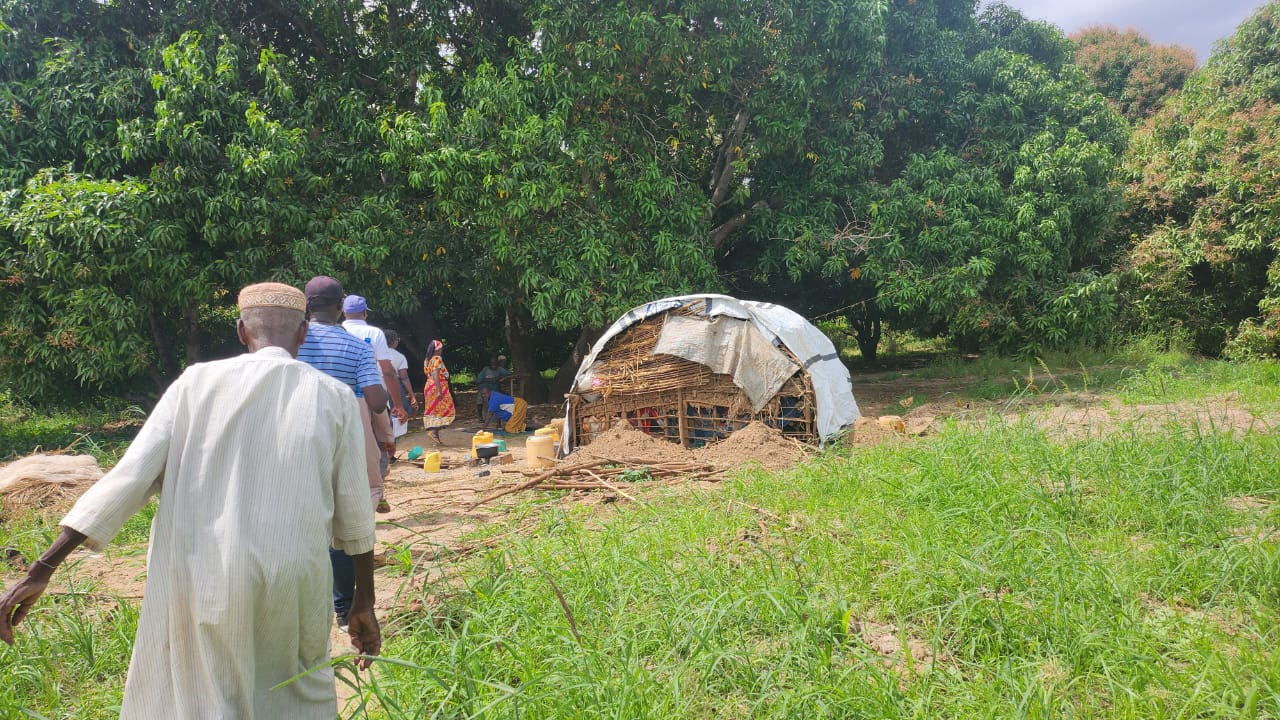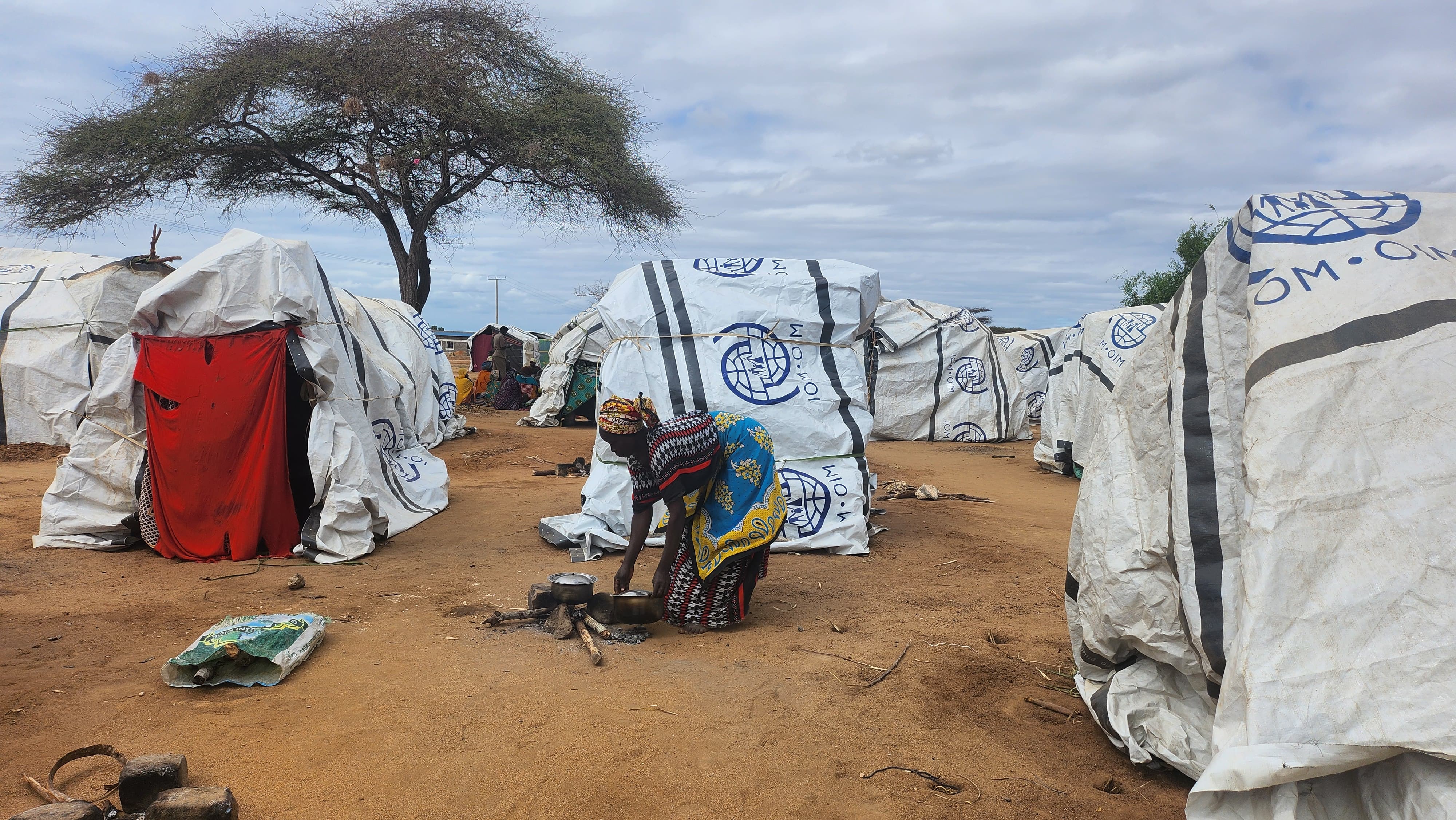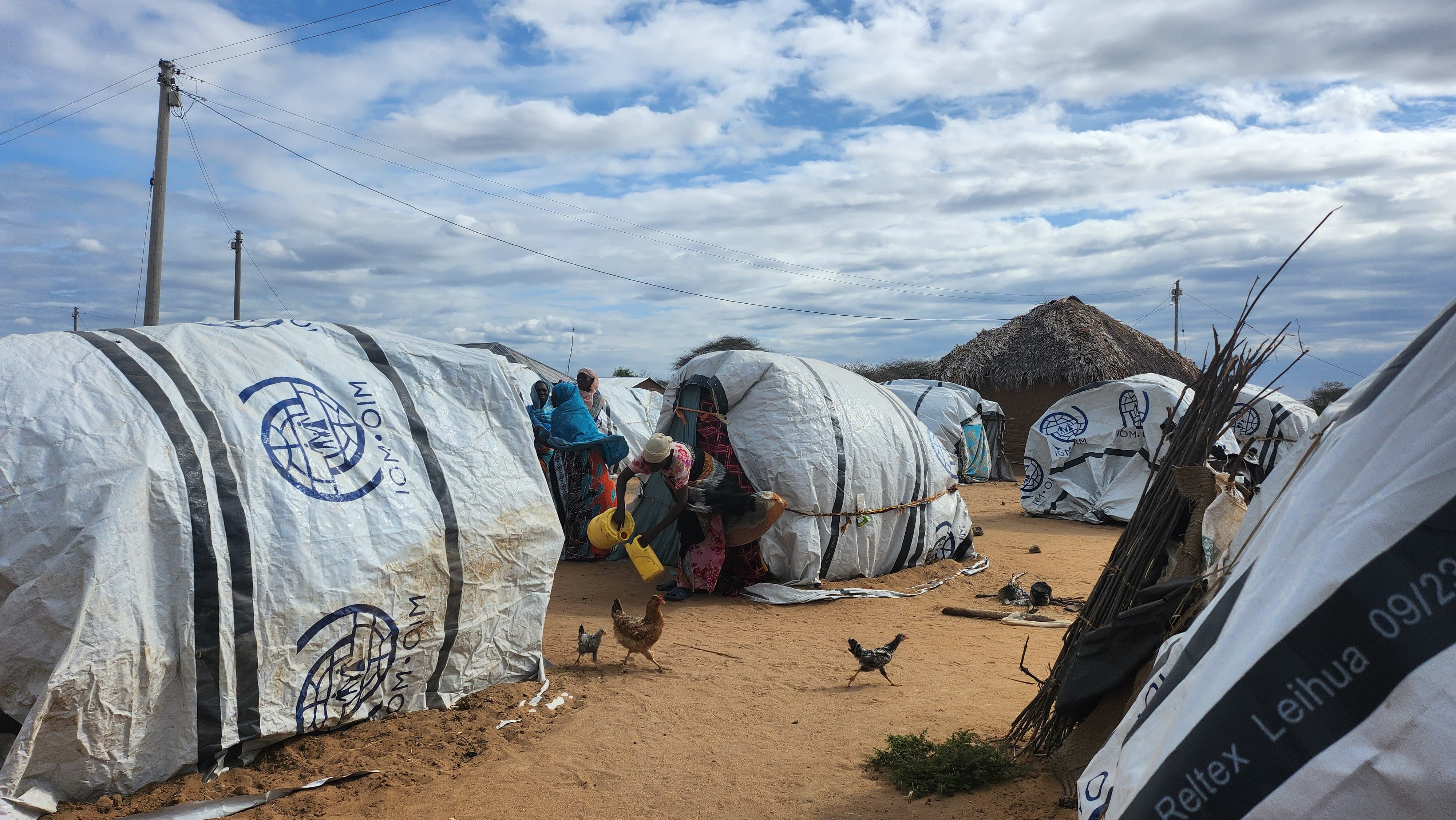
A chaotic blend of wind and remnants of a storm wrecked the Tana Delta in Tana River county that morning.
With dark clouds looming overhead and heavy shadows stretching across the soaked landscape, the air was thick with the scent of damp earth. Under these skies, a pregnant Mary Wanje, 38, was one of many residents on the run for safety. “
The heavy rains that hit this region in May brought calamity. When we were asleep, we heard people shouting. When we woke up, some houses were already submerged,” she says.
Wanje lives in a town impacted by floods. Several Kenyan communities, just like hers, experience erratic climate changes, leading to heavy downpours.
The adverse effects of climate change are an everyday reality to her and thousands of others who have been forced to flee their homes and families.
According to the Kenya Red Cross, Tana River county received heavy rainfalls in March, April and May that left, 13,000 people displaced, 14 dead and nine others missing.
Wanje may have survived the floods, but the experience has taken a toll on her health and well-being.
“I was running with my two children for safety. But as I carried my baby, my house collapsed and hit one of my legs, making us fall. I had no time to think. I panicked,” she recalled during an interview in Odhole village, Tana Delta.
“It was the sound of my fallen baby that woke me up from the anxiety and panic that I was experiencing.”
Fearful about that day’s occurrence, Wanje says her contractions began, sharp and insistent amid the roar of the water that was now sweeping away part of the village.
“I screamed for help but everyone was scampering for safety. So, by that time, my other baby was also struggling. I picked her up but I could not walk for so long,” she said.
The flood showed no mercy to anyone in the Odhole village.
“The urgency grew. I placed my child down and decided to give birth next to some water that was running through a road,” she narrated as tears rolled down her cheeks.
A group of women who noticed the situation came to her aid and cut the placenta. But the situation would not allow her a moment of rest.
With no hospital for her to be rushed to, she had to pick up the newborn, her other children and proceed with the journey.
“At that time, I did not know where I was going to. All of us were just hopeful of reaching a safer place,” she says. She suffered excessive bleeding and struggled to walk, but luckily, she survived the experience.
MENTAL HEALTH WOES
Climate-related hazards like floods are a major driver of global human mobility that kills some and scars others mentally.
According to the journal Climate Change Impacts on Health across the Life Course, published this year, affected women struggle with their mental health.
They experience anxiety, depression and post-traumatic stress disorder.
“Maternal stress during natural disasters affects child development. The climate crisis results in new disorders, such as eco-anxiety and solastalgia (distress that is produced by environmental change),” the journal reads.
Saria Elema, 24, a mother of five who hails from Tana Delta's Mwanja village, had a miscarriage while fleeing for safety.
“I tried to walk carefully to avoid falling down, but then I felt a sharp pain on my left side of the stomach,” she says. “I brushed it off, thinking that maybe I was just tired,” she says.
After five days, Elema noticed that she could not feel any movement in her womb.
Hours later, she then started bleeding profusely and her worst fear was confirmed.
“I had lost the baby. I did not know what to do. I asked myself several questions. Could it be that I was careless or was it because I carried heavy luggage while seeking safety?” she said.
“Even as the blood was coming out, I had no hospitals to visit. It’s rare to find hospitals nearby. So I just took Panadol and stayed without my womb being washed.”

This was not the first time Elema was going through a miscarriage. At one point she lost a two-month pregnancy.
“Last year, after we had also migrated and came to some of these makeshift tents, I started feeling pain. I then decided to just go to the hospital that was far away,” she says.
“With the bad roads and others cut off by the floods, we used the shortest route to try and save the child, but we were told that it was already dead when we arrived at the hospital.” These experiences keep haunting her. “I occasionally think about my unborn babies but I do not have the luxury to dwell on them,” she said.
“My husband often comes over the weekend. Despite the mental state, you cannot tell him that we cannot have sex. I have to be submissive despite my mental state. What can we do? It’s life.”
Her experience illustrate the intersection of resilience and mental health, emphasising the need for supportive systems that address both the psychological impact and the practical aspects of trauma recovery.
According to the International Organisation for Migration, the floods in Tana River were cut off by floods, which affected interventions, including provision of emergency shelter, essential household items and hygiene kits.
According to the Kenya Demographic Health Survey 2022, Tana River was listed as number two with the highest unmet need for family planning at 34 per cent. It followed Marsabit with (38 per cent).
FATHERS ALSO AFFECTED
Mohamed Kone, 46, says his wife also went through loss of her baby as they trekked for safety. “When the water came at night, we had to cross the river and we walked for about 10km on foot,” he says.
“Do you know how it feels to walk all those kilometres with your pregnant wife?” Looking distressed and frustrated, Kone says as a man, their culture does not allow them to express their feelings.
“I was depressed. I felt bad because this was our child, my child. But then as the man of the house, I should not come out as weak,” he says.
“When you speak of what you feel, men will laugh at you out here. So in most cases, we just keep quiet and just hide behind our wives.”
Kone says when they arrived on dry land, he took his wife to a private hospital for treatment.
“I sold my animals and got some money that I used at the hospital, which is 30km away. But by the time I was arriving there, she had lost the baby,” he says.
Kone pleaded with the county government to bring clinics and hospitals that are equipped closer to the people.
“They should even use volunteers to help these people in the society for us to live as a society. The county should also come and counsel these women who go through such,” he says.
Kone says that even men need counselling as much as it’s not publicly put out there that they are struggling.
“Though for the men, it would not be focused on one person. We can call the men and just have a session or something like a focused group session,” he says. Kone says these will help many of the men and women because what really affects them is the grief.
An elder in the region Joseph Owino, says they have received reports of some women who have also lost their children but raised concern that the reports are hardly reported.
“They will not talk about them because they feel embarrassed about them,” he says.
“But these things affect them. How can you lose your baby and behave like everything is okay? How can you give birth without help and behave like you are fine?”
Owino says most of the people are not well educated to know when they are in danger and when they need to get help.
“We need to have medical emergencies where the community can get help. Some of us here are always on the run when it is flooded or even if there is drought. We need to have emergency care and emotional care when that happens,” he says.
Tana River reproductive health coordinator Hawa Abdul says they received about five cases of pregnant women giving birth while running to safety. This occurred during January and February in 2024.
“Three of the pregnancies went through. The babies and the mothers are okay, but we lost two, both the mother and the baby. They have integrated services to the makeshift tents, where most displaced people seek shelter.
“We have the antenatal package, immunisation package and postnatal package. We have made it a routine to visit camps and see if they are safe,” she says.
SEARCH FOR SOLUTIONS
Hawa says they have not received cases of mental trauma or disorders from the internally displaced women.
“We need to plan as a county to have psychosocial support.All we have are these integrated services,” she says.
However, she says they normally do have unstructured talks on risk factors on pregnancies and delivery.
“We talk to the women about these risks and educate them on what they may anticipate. Pre- and post-conception,” she says.
“When we give the talk, it's for all women. We do not segregate so that they do understand what to do when they give birth or when they lose their child.”
She says they have a gender recovery centre at the hospital, where the county has a psychiatrist and psychologist.
“We haven't been able to reach each and every one of the women, but we have reached a few camps through the Red Cross,” she says.
Hawa says as part of ensuring that women undergo psychosocial support, the country is drafting a gender policy.
“The policy talks about Tana River having a bigger rescue centre, safe shelters, a space where women can talk about mental issues and mainstreaming gender issues in every department,” she says.
Health executive Joshua Kofa says caring for the women is a challenge.
“Apart from the funds we have set aside for disasters, we first get products that will assist our people, women and girls,” he says.
Kofa says they provide services as an outreach programme that is in progress.
“The policy is on providing support when emergencies occur like this, but it is holistic,” he says. They have not been able to reach all women in major camps for psychosocial support.
“There are some places that were cut off but we have noted and we are trying to see if we can deploy ambulances to give them support,” he says.
International Organisation for Migration head of policy Faisal Sharif says they provide psychosocial counseling, which is integrated in the antenatal and postnatal programme.
“This way, counsellors can walk a pregnant woman who has gone through loss,” he says.
“This support is provided in both emergency contexts as well as in static facilities.” He says the organisation can partner with the Tana River government to identify these women and provide on-ground support for them.
“Often, some of these groups are heavily ignored. The solution for this is to increase advocacy among community members, in particular the community leaders, who can sway the public opinion among these groups,” he says.
“This works in two ways as it ensures that mental illness is not stigmatised against, and a platform can be provided for women to also begin to speak out.”
Recounting her ordeal, Wanje calls for a permanent solution.
“We need to have stationed facilities for counselling services and also permanent areas to stay. We can’t be moving up and down when the rains come,” she says.












